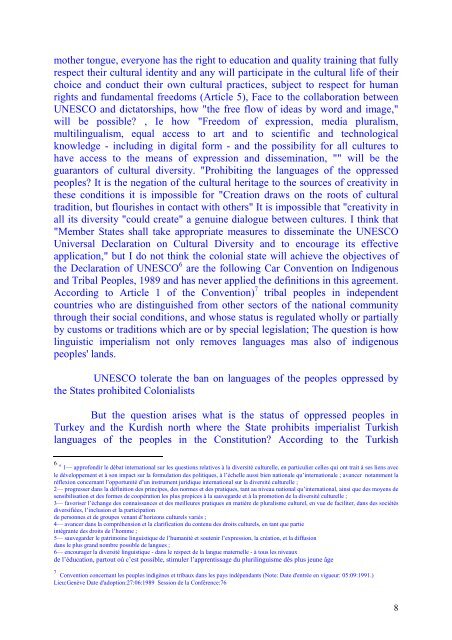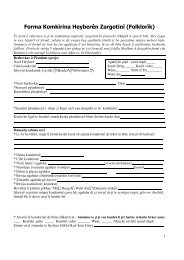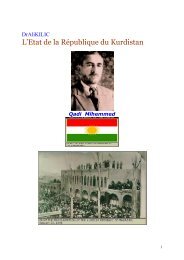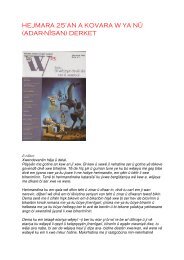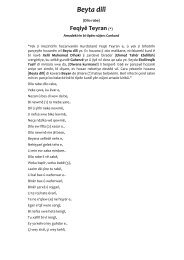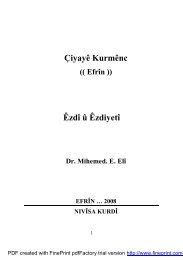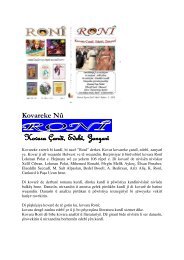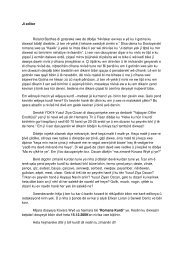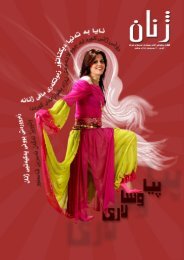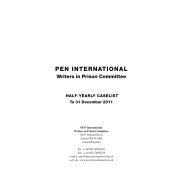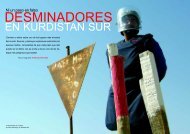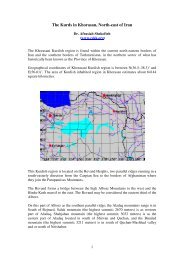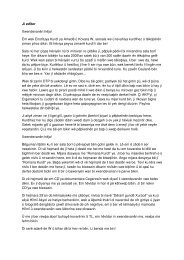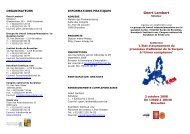UNESCO and The International Day of Mother Language - Pen-Kurd
UNESCO and The International Day of Mother Language - Pen-Kurd
UNESCO and The International Day of Mother Language - Pen-Kurd
- No tags were found...
You also want an ePaper? Increase the reach of your titles
YUMPU automatically turns print PDFs into web optimized ePapers that Google loves.
mother tongue, everyone has the right to education <strong>and</strong> quality training that fully<br />
respect their cultural identity <strong>and</strong> any will participate in the cultural life <strong>of</strong> their<br />
choice <strong>and</strong> conduct their own cultural practices, subject to respect for human<br />
rights <strong>and</strong> fundamental freedoms (Article 5), Face to the collaboration between<br />
<strong>UNESCO</strong> <strong>and</strong> dictatorships, how "the free flow <strong>of</strong> ideas by word <strong>and</strong> image,"<br />
will be possible , Ie how "Freedom <strong>of</strong> expression, media pluralism,<br />
multilingualism, equal access to art <strong>and</strong> to scientific <strong>and</strong> technological<br />
knowledge - including in digital form - <strong>and</strong> the possibility for all cultures to<br />
have access to the means <strong>of</strong> expression <strong>and</strong> dissemination, "" will be the<br />
guarantors <strong>of</strong> cultural diversity. "Prohibiting the languages <strong>of</strong> the oppressed<br />
peoples It is the negation <strong>of</strong> the cultural heritage to the sources <strong>of</strong> creativity in<br />
these conditions it is impossible for "Creation draws on the roots <strong>of</strong> cultural<br />
tradition, but flourishes in contact with others" It is impossible that "creativity in<br />
all its diversity "could create" a genuine dialogue between cultures. I think that<br />
"Member States shall take appropriate measures to disseminate the <strong>UNESCO</strong><br />
Universal Declaration on Cultural Diversity <strong>and</strong> to encourage its effective<br />
application," but I do not think the colonial state will achieve the objectives <strong>of</strong><br />
the Declaration <strong>of</strong> <strong>UNESCO</strong> 6 are the following Car Convention on Indigenous<br />
<strong>and</strong> Tribal Peoples, 1989 <strong>and</strong> has never applied the definitions in this agreement.<br />
According to Article 1 <strong>of</strong> the Convention) 7 tribal peoples in independent<br />
countries who are distinguished from other sectors <strong>of</strong> the national community<br />
through their social conditions, <strong>and</strong> whose status is regulated wholly or partially<br />
by customs or traditions which are or by special legislation; <strong>The</strong> question is how<br />
linguistic imperialism not only removes languages mas also <strong>of</strong> indigenous<br />
peoples' l<strong>and</strong>s.<br />
<strong>UNESCO</strong> tolerate the ban on languages <strong>of</strong> the peoples oppressed by<br />
the States prohibited Colonialists<br />
But the question arises what is the status <strong>of</strong> oppressed peoples in<br />
Turkey <strong>and</strong> the <strong>Kurd</strong>ish north where the State prohibits imperialist Turkish<br />
languages <strong>of</strong> the peoples in the Constitution According to the Turkish<br />
6 6<br />
1— appr<strong>of</strong>ondir le débat international sur les questions relatives à la diversité culturelle, en particulier celles qui ont trait à ses liens avec<br />
le développement et à son impact sur la formulation des politiques, à l’échelle aussi bien nationale qu’internationale ; avancer notamment la<br />
réflexion concernant l’opportunité d’un instrument juridique international sur la diversité culturelle ;<br />
2— progresser dans la définition des principes, des normes et des pratiques, tant au niveau national qu’international, ainsi que des moyens de<br />
sensibilisation et des formes de coopération les plus propices à la sauvegarde et à la promotion de la diversité culturelle ;<br />
3— favoriser l’échange des connaissances et des meilleures pratiques en matière de pluralisme culturel, en vue de faciliter, dans des sociétés<br />
diversifiées, l’inclusion et la participation<br />
de personnes et de groupes venant d’horizons culturels variés ;<br />
4— avancer dans la compréhension et la clarification du contenu des droits culturels, en tant que partie<br />
intégrante des droits de l’homme ;<br />
5— sauvegarder le patrimoine linguistique de l’humanité et soutenir l’expression, la création, et la diffusion<br />
dans le plus gr<strong>and</strong> nombre possible de langues ;<br />
6— encourager la diversité linguistique - dans le respect de la langue maternelle - à tous les niveaux<br />
de l’éducation, partout où c’est possible, stimuler l’apprentissage du plurilinguisme dès plus jeune âge<br />
7 Convention concernant les peuples indigènes et tribaux dans les pays indépendants (Note: Date d'entrée en vigueur: 05:09:1991.)<br />
Lieu:Genève Date d'adoption:27:06:1989 Session de la Conférence:76<br />
8


